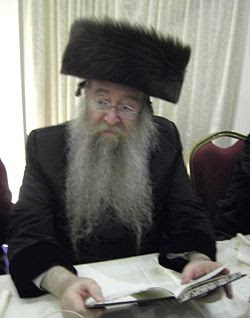
(Devarim 1:17)"...Lo Saguru mipnei ish ki hamishpat lelokim..."
"...You shall not tremble before any man for the judgement is G-d's..."
When Reb Shmelke first moved to the town of Nikolsburg to be their Rabbi and Judge he immediately hung a staff and pouch up next to his stand. He said, "I want everyone to know, especially the Parnassim that my judgment will not be swayed by shochad (bribes) or individual relationships."
The staff and pouch were a sign to everyone that the Rabbi would not find immediate favor in their eyes. That he would leave town before judging a friend or confidant favorably without knowing the truth.
* The above image is a picture of Reb Shmelke's 6th generation descendant, Rav Mechel Lebowitz Shlit"a
* Here is a Wikipedia entry on Reb Shmelke: (link)


